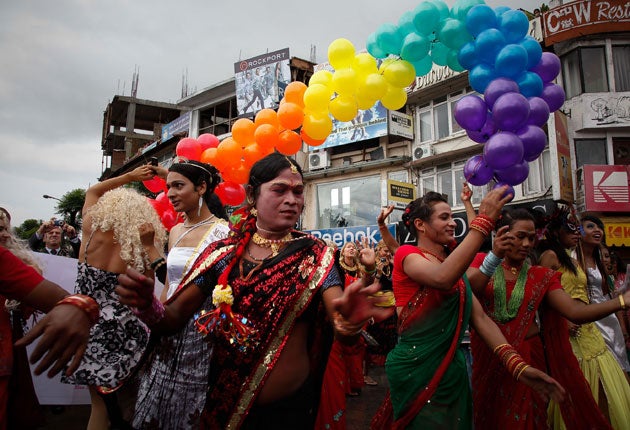Himalayan kingdom throws open its doors to gay tourists

Your support helps us to tell the story
From reproductive rights to climate change to Big Tech, The Independent is on the ground when the story is developing. Whether it's investigating the financials of Elon Musk's pro-Trump PAC or producing our latest documentary, 'The A Word', which shines a light on the American women fighting for reproductive rights, we know how important it is to parse out the facts from the messaging.
At such a critical moment in US history, we need reporters on the ground. Your donation allows us to keep sending journalists to speak to both sides of the story.
The Independent is trusted by Americans across the entire political spectrum. And unlike many other quality news outlets, we choose not to lock Americans out of our reporting and analysis with paywalls. We believe quality journalism should be available to everyone, paid for by those who can afford it.
Your support makes all the difference.Gay rights activists in Nepal are hoping to attract up to 200,000 pink tourists this year as the Himalayan nation seeks to boost its coffers after years of political instability.
The authorities in Kathmandu have recently announced plans to push the promotion of tourism in 2011 with the aim of attracting up to 1 million visitors. And with Nepal gradually becoming one of the nations in south Asia where gay and lesbian rights are most solidly enshrined in law, activists and those within the tourism industry believe gay tourism is set to take off. Among the travel opportunities already being promoted to international gay visitors are wedding and honeymoon celebrations at the base camp of Mount Everest.
"Nepal is a good place for any tourists, but for pink tourists Nepal is comparably more friendly than our neighbours to the north and south," said Sunil Babu Pant, who in 2008 became the country's first openly gay MP. "Tourism is an important part of the country's economy, next to hydro-power. But the hydro-power projects always face problems because of political disagreements. The tourism industry can carry on regardless of political disputes. Gay tourism is a large potential market and Nepal can benefit. We would like to attract up to 200,000 visitors."
In 2008, the year it ousted the monarchy and became a republic, Nepal also became the first country in south Asia to decriminalise homosexuality, a move that many believed would boost the country's chances of becoming a destination for gay tourists. Same-sex marriage has since become legal and equal rights for gays and lesbians have been demanded by the country's highest court. The country also issues so-called "third gender" identity cards for transsexuals.
Mr Pant, a member of the Communist Party of Nepal-United (CPN-U), has a personal stake in realising that aim. In addition to his roles as a legislator and head of the country's first gay rights organisation, Blue Diamond, he also opened Nepal's first gay travel agency, Pink Mountain Tours and Travel, which is already promoting itself around the world. Mr Pant believes there is a particularly large untapped market in both China and India. Gay tourism was worth around $100bn a year globally. Already, he has received inquiries from gay Buddhist couples and groups who would like to travel to Nepal, tour the country's many monasteries and visit the Buddha's birthplace at Lumbini.
Nepal is still trying to overcome the devastating consequences of a decade-long civil war between Maoist rebels and government forces which left more than 16,000 people dead and left the nation deeply traumatised. A UN mission set up in 2007 to help the country find a peaceful settlement is to close this week, with some analysts pointing out Nepal still faces huge hurdles amid disputes between the Maoists, who now hold seats in parliament, and political rivals.
For more than six months, the country has been without a formally agreed government and there have been 16 failed attempts in parliament to vote for a new prime minister. Work on a new constitution remains stalled.
At the height on the insurgency, 10 years ago, many potential tourists were put off travelling to Nepal but last year there were 500,000 visitors, contributing $370m to the economy. Officials within the interim government believe those numbers could be doubled this year. They also recognise the high-spending potential of gay and lesbian visitors.
"They spend a lot, and we want tourists in this country who will spend a lot," Kishore Thapa, the secretary of tourism, told the Washington Post.
Mr Pant dismissed suggestions that locals in Nepal – which until 1949 was closed to foreigners – were too conservative to welcome gay tourists. "The rural part of Nepal was closed off by rulers not by the locals. Now that has changed," he said. "Rural people are usually more friendly than those in the cities."
Join our commenting forum
Join thought-provoking conversations, follow other Independent readers and see their replies
Comments